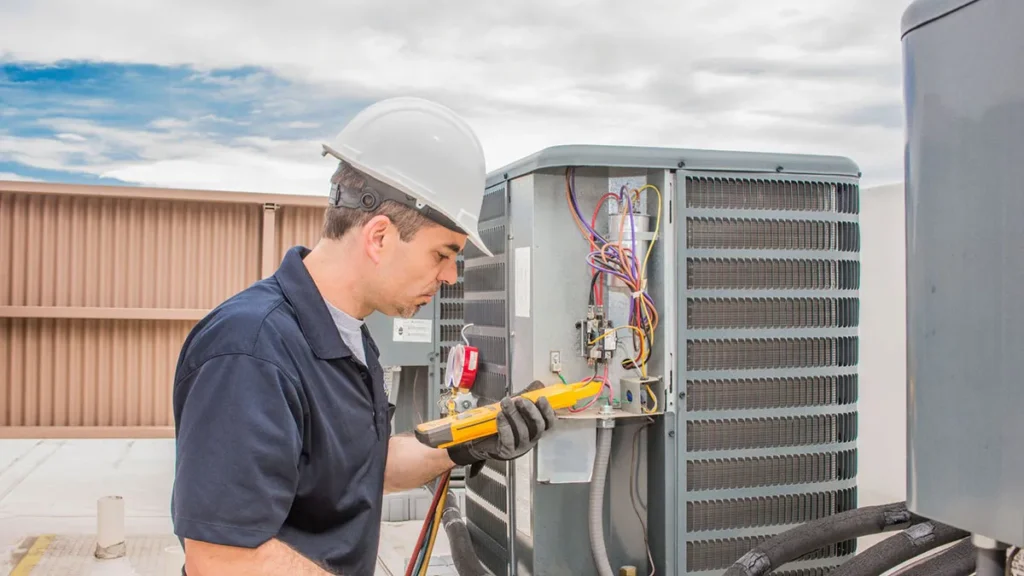If you’ve ever felt the frustration of an air conditioner that won’t cool or, worse, won’t start at all on a hot day, you know the importance of every part working perfectly. One small but crucial component in this cooling equation is the AC capacitor. When things go south with this part, it could spell trouble for the entire system.
But diagnosing a bad capacitor isn’t always straightforward, nor is it the first thing that comes to mind when your AC starts acting up. Here, we will unravel the mystery behind those AC mishaps that could very well point to a capacitor problem. We’ll walk you through the basic “whys” and “hows” of a failing capacitor and help you identify the telltale signs before you find yourself facing the heatwave unprepared.
With practical advice, we’ll help you tackle capacitor troubles or decide when it’s time for professional help. Let’s get started on AC capacitor basics.
Quick Checklist: Signs of a Bad AC Capacitor
If your air conditioning system shows any of the following signs, a faulty capacitor might just be the culprit. Keep an eye out for these red flags:
- AC unit is not turning on: If pressing the power button doesn’t start your unit, the capacitor could be to blame.
- A humming noise from the AC unit: A distinctive hum when the unit is struggling to turn on is a classic sign of capacitor problems.
- The AC unit turns off on its own: Unexpected shutdowns can be related to a capacitor failing to store enough power.
- The AC unit takes time to start once you turn it on (hard starting): If there’s a lag between starting the AC and actual operation, consider checking the capacitor.
- The AC unit’s fan is not running while the system is on: When the fan isn’t moving, it’s often a signal the capacitor isn’t delivering the necessary startup energy.
- The AC system is not blowing cold air: Inconsistent cooling can sometimes point to a capacitor struggling to maintain regular function.
- Visible swelling or leakage from the AC capacitor: Physical deformities on the capacitor are tell-tale signs it’s time for a replacement.
Understanding AC Capacitors
Air conditioning systems are complex machines, and one of the most essential components keeping them running is the AC capacitor. Think of an AC capacitor as a battery’s bigger, brawnier cousin: it stores and releases electrical energy to power up the AC unit’s motors. Without a working capacitor, your air conditioner can’t start up or keep running.
What is an AC Capacitor?
An AC capacitor is a small cylindrical component that supplies the necessary jolt to start the motor and maintains a steady stream of energy to keep the motor running. It’s essentially the kick-starter of your AC unit, enabling the system to power up quickly and maintain power by stabilizing the voltage during operation.
The capacitor is charged with the task of holding and dispatching electrical charge. It collects the energy until the AC unit signals for a start-up, and then it unleashes a burst of energy to jumpstart the motor. Once the unit is running, the capacitor’s job isn’t over; it continues to cycle, charging and releasing as needed to keep the system humming along smoothly.
Types of AC Capacitors
AC capacitors come in two main varieties: start capacitors and run capacitors. Though they perform similar functions, their roles and timing in the unit’s operation are distinct.
Start Capacitors
Start capacitors are the sprinters in the relay race; they give the motor the initial start-up energy boost it needs. They only come into play for a brief moment when the air conditioner starts. Once the motor reaches operational speed, a relay disconnects the start capacitor from the circuit until the next start-up cycle.
Run Capacitors
On the other hand, run capacitors are the marathon runners. They work continuously throughout the operation of the AC unit to maintain a steady voltage supply and power the motor. These capacitors are designed to stay active and keep the energy flowing as long as the system needs to run, ensuring that your AC operates efficiently and without interruption.
Understanding the difference between these two types of capacitors can help when diagnosing problems or talking with an HVAC professional about maintenance or repair. A malfunction in either can lead to performance issues with your air conditioning unit, but the symptoms and solutions may differ depending on which capacitor is at fault.
Step-By-Step Guide: Identifying a Bad Capacitor
Diagnosing a bad AC capacitor is a process that can be done visually and with the use of a multimeter, a handy tool that measures electrical current, resistance, and voltage. Here’s how you can identify a bad capacitor in your AC unit.
Visual Inspection
Before getting your hands on any tools, a simple visual check can reveal a lot about the health of your AC capacitor. Follow these steps:
- Safety First: Ensure the AC unit is turned off. For safety, you should also turn off the power to your AC unit at the breaker box.
- Access the Capacitor: Open the AC service panel. Usually, this is found on the outdoor unit and may require a screwdriver to open.
- Examine the Capacitor: Look for these signs that can indicate a problem with the capacitor:
- Swelling or Bulging: Compare the top of the capacitor to the sides. It should be flat, not domed or swollen.
- Rust or Leakage: Any rust around the terminals or oily residue on the capacitor body can suggest a leak, which is a clear sign the capacitor has failed.
- Discoloration: Burn marks or significant discoloration could indicate overheating or an electrical short inside the component.
If you observe any of these issues during your inspection, it’s quite possible the capacitor is bad and will need to be replaced. However, visual signs aren’t always present, which is where a multimeter comes into play.
Multimeter Testing
Testing with a multimeter provides a more concrete assessment of capacitor health. To test an AC capacitor using a multimeter, follow these instructions:
- Ensure Safety: Confirm that all power to the unit is shut off at the breaker box.
- Remove the Capacitor: Discharge any stored power in the capacitor to avoid a dangerous shock. You can do this by placing an insulated screwdriver across the capacitor’s leads, making sure you are holding onto the insulated handle and not touching the metal parts of the screwdriver.
- Set the Multimeter: Adjust the multimeter to the ‘Capacitance’ setting. If your multimeter does not have this setting, you’ll need to measure resistance instead.
- Take a Reading: For capacitance, attach the multimeter leads to the capacitor’s terminals. The reading should fall within the range specified on the capacitor label. A zero reading, or one significantly outside the specified range, means the capacitor is defective.
- For resistance (Ohms) testing:
- Attach the multimeter leads to the capacitor’s terminals.
- Watch the multimeter’s display for a momentary jump in resistance, then a fall back to infinity (open loop) if the capacitor is good. If there is no movement or constant low resistance, the capacitor may be bad.
- Evaluate the Results: Match your reading with the expected range from the capacitor. A healthy capacitor will show a reading in microfarads (μF) within 6% of the unit’s rated capacitance. Discrepancies outside this range indicate a faulty capacitor.
- For resistance (Ohms) testing:
Through these steps, even those new to AC maintenance can assess whether a capacitor is functioning properly or not. If your inspections or tests suggest a capacitor issue, it’s best to leave replacement to the professionals unless you have experience with such repairs.
Remember, handling capacitors and other electrical components can be hazardous and should only be attempted by those with proper knowledge and safety training.
Causes of AC Capacitor Failures
AC capacitor failure is a relatively common issue but can stem from various factors. Understanding these can help you prevent future problems and maintain your air conditioning unit’s efficiency. Here’s a look at some of the causes of capacitor failure.
Common Reasons for Capacitor Wear and Tear or Failure
- Age: Capacitors have a finite lifespan and tend to wear out over several years of regular use. The aging process deteriorates the metallic parts of the capacitor, reducing its efficiency until it eventually fails.
- Overheating: The capacitor can overheat if the AC unit works too hard, usually on hot days or due to an overburdened system. Overheating can cause the internal chemicals in the capacitor to break down faster.
- Power Surges: Sudden surges of electrical power, such as those from lightning strikes or erratic supply, can overwhelm and damage capacitors.
- Voltage Rating Exceeded: If the actual voltage exceeds the voltage rating on a capacitor, it can cause the capacitor to fail. This situation can occur if the wrong type of capacitor is installed or if there is a malfunction in the AC system causing excessive power draw.
- Improper Charging During Installation: If not charged correctly at installation, a start capacitor may not provide the needed energy to start the motor, leading to strain and early failure.
- Electrical Shorts: An electrical short in the system can cause a capacitor to receive a higher current than it’s designed to handle, leading to failure.
- Faulty AC Components: Other failing parts within the AC unit can place additional strain on the capacitor. For instance, a failing motor may require more start-up energy, overworking the capacitor.
Environmental Factors that Can Contribute to Capacitor Problems
- High Ambient Temperatures: Capacitors are rated for certain temperature ranges, and operating an AC unit in temperatures beyond this range can lead to a shortened lifespan.
- Humidity: Excessive humidity can corrode capacitor contacts and wiring over time, which can impair function and eventually lead to failure.
- Corrosive Atmosphere: Living in areas with high levels of atmospheric corrosion, such as near the ocean where there’s a lot of saltwater spray, can damage AC components, including the capacitor.
- Poor Ventilation: Lack of adequate air circulation around the AC unit can cause the system to run hotter than normal, which can put extra stress on the capacitor.
- Pest and Rodent Damage: Small animals and insects may nest inside the outdoor AC unit, causing damage to the capacitor and other components through chewing and nesting activities.
- Dirty AC Components: Dirt, grime, and debris can accumulate on the capacitor and other AC components, leading to overheating and failure. Regular cleaning as part of AC maintenance can prevent these issues.
Understanding these factors can help you in maintaining your air conditioning system and prolonging the life of its capacitors. Regular check-ups by a professional can spot early signs of wear and tear, allowing you to replace components before they fail and cause more significant problems or a complete system shutdown.
Keeping Your Cool with Steve’s Plumbing & AC
No one likes the discomfort and inconvenience of a malfunctioning AC unit, especially when it’s due to something as critical yet easily overlooked as a capacitor. While we’ve delved deep into understanding and identifying issues with AC capacitors, remember that addressing electrical components can be risky without the right expertise.
For those not inclined to DIY repairs, Steve’s Plumbing & AC is your go-to professional service. Our expert team doesn’t just stop at capacitors; we handle a full range of AC issues, from regular tune-ups and timely repairs to complete installations. We ensure your AC unit runs smoothly, providing you with peace of mind and reliable service when you need it most.
We pride ourselves on quick, efficient service that gets to the root of the problem without unnecessary delays. With Steve’s Plumbing & AC, you can expect quality ac repair service in Hawaii that ensures your AC system performs at its best, keeping you cool and comfortable all year round.
Don’t let AC troubles get you hot under the collar. Reach out to us for any AC needs at (808) 563-4054 – we’re here to help keep your home or business a refreshing retreat from the heat.


